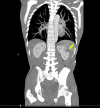The Management of Acute Onset Complete Heart Block and Atrial Flutter in a Patient with COVID-19
- PMID: 35265539
- PMCID: PMC8900571
- DOI: 10.12890/2022_003026
The Management of Acute Onset Complete Heart Block and Atrial Flutter in a Patient with COVID-19
Abstract
Coronavirus disease (COVID-19) has infected millions of people worldwide. Its cardiac presentations include myocarditis, arrhythmias and structural heart changes even in young and healthy individuals. The long-term sequelae of these manifestations are unknown. We describe a unique combination of complete heart block and atrial flutter in the setting of COVID-19. SARS-CoV-2 virulence mechanisms can cause fibrosis in the myocardium resulting in loss of sinus node dominance. The paradoxical finding of atrial flutter and complete heart block is very rare. Prompt cardiac evaluation and electrophysiological testing are important. Cardiac magnetic resonance imaging (cMRI) and endomyocardial biopsies are the gold standard investigations. Anticoagulation should be administered until atrioventricular synchrony is achieved.
Learning points: Simultaneous atrial flutter and third-degree atrioventricular block (AVB) caused by COVID-19 infection should be treated with a pacemaker according to heart block guidelines.During the COVID-19 pandemic, we recommend leadless pacemaker implantation for third-degree AVB as it has a lower risk of infection compared with traditional percutaneous procedures.Due to a lack of long-term data, patients with cardiac manifestations from COVID-19 require close follow-up with individualized surveillance schedules.
Keywords: COVID-19; Complete heart block; atrial flutter.
© EFIM 2022.
Conflict of interest statement
Conflicts of Interests: The authors declare there are no competing interests.
Figures





Similar articles
-
Modulation of atrioventricular conduction by ablation of the "slow" atrioventricular node pathway in patients with drug-refractory atrial fibrillation or flutter.J Am Coll Cardiol. 1995 Jan;25(1):39-46. doi: 10.1016/0735-1097(94)00315-h. J Am Coll Cardiol. 1995. PMID: 7798523
-
A case report of unusually long episodes of asystole in a severe COVID-19 patient treated with a leadless pacemaker.Eur Heart J Case Rep. 2020 Jul 30;4(FI1):1-6. doi: 10.1093/ehjcr/ytaa238. eCollection 2020 Oct. Eur Heart J Case Rep. 2020. PMID: 33089056 Free PMC article.
-
A case report of a rare cardiac complication in novel coronavirus disease.Eur Heart J Case Rep. 2020 Nov 14;4(6):1-4. doi: 10.1093/ehjcr/ytaa323. eCollection 2020 Dec. Eur Heart J Case Rep. 2020. PMID: 33442589 Free PMC article.
-
Has COVID-19 changed the spectrum of arrhythmias and the incidence of sudden cardiac death?Herz. 2023 Jun;48(3):212-217. doi: 10.1007/s00059-023-05186-2. Epub 2023 Jun 5. Herz. 2023. PMID: 37277617 Free PMC article. Review.
-
COVID-19 and Cardiac Arrhythmias.Hamostaseologie. 2021 Oct;41(5):372-378. doi: 10.1055/a-1581-6881. Epub 2021 Oct 25. Hamostaseologie. 2021. PMID: 34695853 Review.
Cited by
-
Drug-Induced Complete Atrioventricular Block in an Elderly Patient: A Case Report Highlighting Digoxin-Beta Blocker Interactions and a Paradoxical State.Life (Basel). 2025 Jan 31;15(2):215. doi: 10.3390/life15020215. Life (Basel). 2025. PMID: 40003624 Free PMC article.
References
-
- Lakkireddy DR, Chung MK, Gopinathannair R, Patton KK, Gluckman TJ, Turagam M, et al. Guidance for cardiac electrophysiology during the COVID-19 pandemic from the Heart Rhythm Society COVID-19 Task Force; Electrophysiology Section of the American College of Cardiology; and the Electrocardiography and Arrhythmias Committee of the Council on Clinical Cardiology, American Heart Association. Circulation. 2020;141(21):e823–e831. - PMC - PubMed
LinkOut - more resources
Full Text Sources
Miscellaneous
